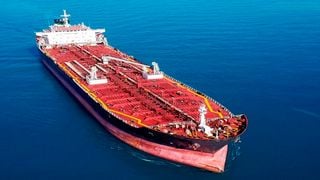
An oil tanker. Two companies are engaged in a court fight over who should claim a Sh17bn diesel consignment after offloading at the Mombasa Port.
| FileOur Columnists
Premium
Too much ping-pong on fuel saga
At first, I thought the political and media circus around the Ann Njeri Njoroge affair was about an exposé of a big global procurement and money laundering scheme involving evasion of trade in US-sanctioned Russian oil.
The saga had all the elements of a blockbuster. First, the allegations about the involvement of Russia-based oil refineries in the transaction. Secondly, the mention of the involvement of transhipment points and routes located in Azerbaijan. Indeed, ports and locations in jurisdictions close to Russia, like Azerbaijan, are suspected to have emerged as key hubs for skirting US sanctions on trade in embargoed Russian oil.
I thought the Sh17 billion fuel saga would end up providing fresh insights into the playbook and the activities of the network of shell companies involved in evading sanctions, the intermediate ports used to redirect cargo and how shipping documents were switched to allow illicit flow of trade in sanctioned oil to East Africa.
The blockbuster did not happen. There were no ‘wow’ revelations at the end of the saga. It turned into an anti-climax when it emerged that the cargo whose ownership was in dispute emanated from neither Azerbaijan nor Russia.
Who was the true owner of the oil and the ultimate beneficiary? We shouldn’t have wasted that much time interrogating the issue of ownership of the cargo since the answer is very basic. All you need to do is to scrutinise documents on proof of payment. Who paid for the oil? Who chartered the ship that brought it to Mombasa?
As we all know, internationally traded oil is not paid for in cash. It is about trade finance. Thus, Ms Njoroge should have been asked to table the letters of credit, the bank that issued the documents and the confirmation that the cargo had, indeed, been paid for by her. And if we wanted to take it beyond the conspiracy theories that were swirling around, we should have also demanded details such as the names of the international triple A-rated banks that confirmed the letters of credit (obviously) issued by a local bank in Kenya.
How was Ms Njoroge going to transport the oil out of Mombasa in case it was determined that she was the true owner of the cargo? Here is a bit of background of what the regulatory landscape looks like.
Since April 2012, oil imports into Kenya have been a heavily regulated and monitored affair. That was the year when the government modelled a competitive mode of procurement of petroleum products known as the Open Tendering System (OTS). This is the only system through which oil marketing companies can access the products. It ensures that all imported oil arrives at the same landed price.
Stiffly regulated regime
It is a stiffly regulated regime primarily run and overseen by the Ministry of Petroleum but constantly monitored and tracked by government-private sector committees. An entity called Supplycor monitors and tracks flows within the pipeline. The Vessel Scheduling Committee has the responsibility of projecting monthly demand—a procedure that has to take place before bidding for tenders is conducted. The Ullage Allocation Committee coordinates the sharing of the space in storage tanks among the oil companies.
Although the OTS regime was modified following the introduction of a so-called government-to-government (G-to-G) arrangement on March 10 this year, the regulations remain firmly in place. Indeed, the only major change is that, instead of all the 30 registered oil companies in the country, only three are now allowed to import fuel.
Another committee has entered the space following the advent of the G-to-G arrangement: The Treasury and Risk Management Committee. This draws members from the Central Bank of Kenya, Petroleum and Energy Regulatory Authority and investment bankers representing the six commercial banks involved in the G-to-G arrangement—namely, KCB, UBA, Stanbic, Diamond Trust and Mauritius Commercial Bank.
Complex regime
I don’t see how Ms Njoroge was going to be successful in her attempt at circumventing this complex regime, landing cargo at Kipevu outside the OTS system and transporting it upcountry. Her other big hurdle would have been the US sanctions.
Unlike the case, and the situation in other countries in this region, our petroleum marketing sector is more than 50 per cent dominated by international oil companies with headquarters in Western European capitals. Selling US-sanctioned Russian oil in this market can be extremely difficult.
On issues to do with oil, we are a society that plays fast and loose with facts. For instance, is the landed cost of oil in Tanzania cheaper than in Kenya? As we all know, international pricing is calculated from a benchmark price (Platts) plus freight and premium. Tanzania’s OTS pricing is published every month. But in the post-truth world this society is in, we dare not go beyond popular conspiracy theories.





